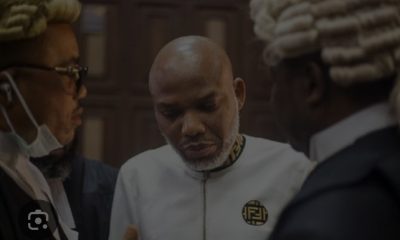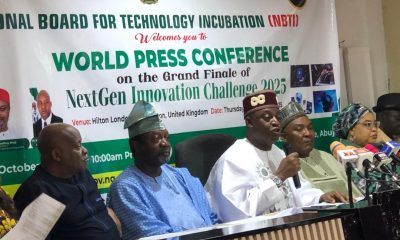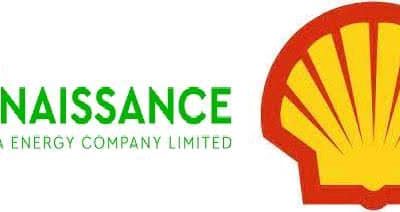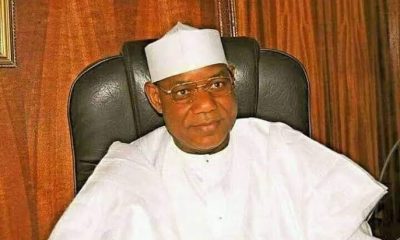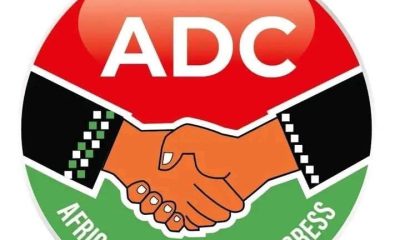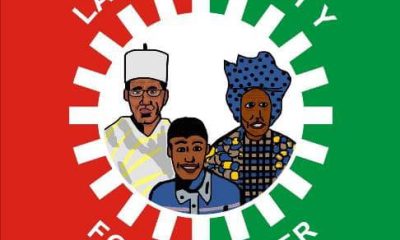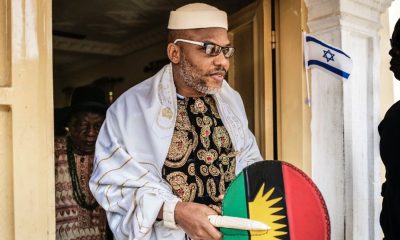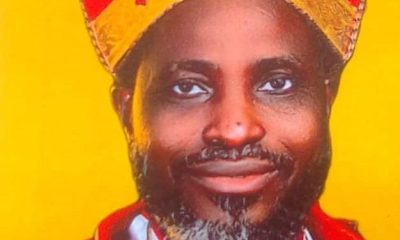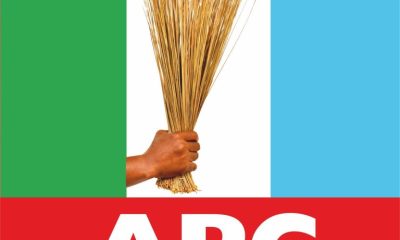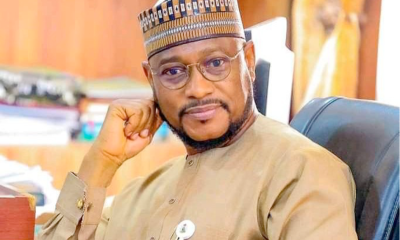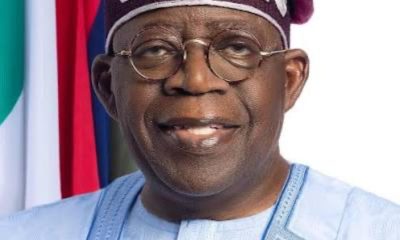Politics
10th Senate: The uncommon renaissance
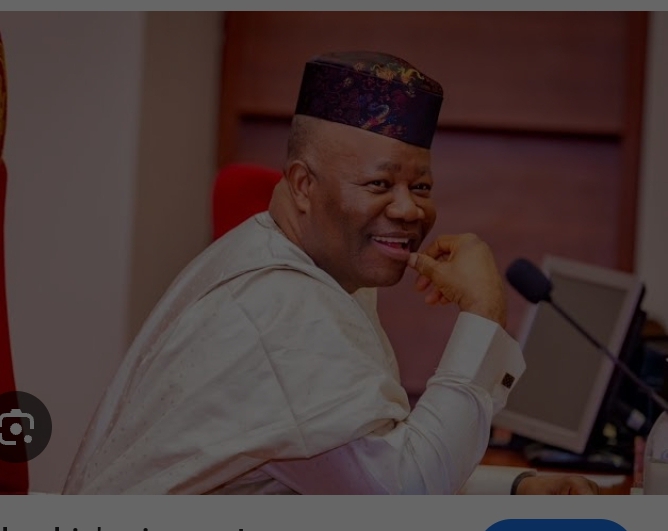
By Ken Harries Esq
In the kaleidoscopic turbulence of Nigerian politics, where discord often drowns out dialogue and egos flare like Harmattan wildfires, the 10th Senate under Senate President Godswill Akpabio has emerged as a lighthouse of stability, reform, and nation-building. Since its inauguration on 13 June 2023, following the proclamation of President Bola Ahmed Tinubu, the Red Chamber has not merely occupied its hallowed halls; it has transformed them into a crucible of progress and a bastion of democratic resilience.
Akpabio, once christened the Uncommon Transformer for his transformative achievements as Governor of Akwa Ibom State, has brought the same audacity of vision into national legislative leadership. With strategic foresight, inclusive diplomacy, and a Nigerian pragmatism that can coax cooperation even from the most unlikely quarters, he has wielded the gavel with conviction.
As the 10th Senate marked its second anniversary on 13 June 2025, the record spoke for itself: 844 bills introduced, 96 passed, and 55 assented to by the President. This output is not merely arithmetic; it is the living pulse of a democracy that works when guided by vision, courage, and resolve.
● Navigating crisis: Fuel subsidy removal
The emergence of Akpabio as Senate President was not a gentle procession but a contest of wills. His victory, forged in the crucible of democratic competition against seasoned heavyweights such as Senators Abdulaziz Yari and Orji Uzor Kalu, testified to his mastery of coalition-building. Partnering Senator Barau Jibrin as Deputy Senate President, Akpabio wove together the allegiance of over 65 senators from across political divides. That foundation of unity, painstakingly crafted, became indispensable in the months that followed.
The first test came swiftly. President Tinubu’s declaration of fuel subsidy removal in June 2023 threatened to ignite a national inferno. Overnight, the pump price of fuel tripled. Families groaned, transport fares skyrocketed, and anger simmered across the land. Nigeria stood on the brink of upheaval. Many feared a collapse into chaos.
Yet it was in this cauldron of crisis that the 10th Senate under Akpabio showed its mettle. Through open plenary debates, robust committee briefings, and nationwide media engagements, the Senate demystified the policy. Akpabio, speaking with the calm authority of a village elder settling a quarrel in the marketplace, reminded Nigerians that the subsidy had become a millstone choking the nation’s future.
Crucially, the Senate did not stop at rhetoric. Working with the Executive, it ensured that the savings, over ₦4 trillion within the first year, were redirected into measures with immediate and visible impact. The Student Loan Scheme opened doors for young Nigerians previously locked out of higher education. Infrastructure projects sprang up from Lagos to Maiduguri, stitching together the nation’s geography. Social welfare programmes, including conditional cash transfers, put money directly into the hands of the most vulnerable.
The results, though still unfolding, are undeniable. Deregulation unleashed price warrant competition, allowing market forces to spur efficiency in the petroleum sector. Supply chains once broken began to stabilise. Private investment, long wary of Nigeria’s fiscal unpredictability, began to return. What could have been a national conflagration instead became a bold step towards renewal, all thanks to a Senate that chose dialogue and decisiveness over dithering.
● Legislative achievements: Reforming Nigeria’s economy
If the Senate’s role in stabilising the polity earned respect, its legislative record secured admiration. Within two years, the chamber introduced 844 bills, passed 96, and saw 55 assented to by the President. This legislative tempo, unmatched in recent Nigerian history, reflected not only productivity but purpose.
The handling of the Tax Reform Bills exemplifies this. Greeted with widespread scepticism and outright rejection when first introduced, they could have derailed public trust. Instead of ramming them through, Akpabio’s Senate paused, listened, and recalibrated.
Extensive consultations with stakeholders, from business leaders to labour unions, produced refined legislation now hailed as a cornerstone of Nigeria’s business-friendly fiscal environment. Today, tax laws are streamlined to encourage enterprise, attract foreign direct investment, and boost government revenue without stifling growth.
The Senate’s oversight responsibilities have also been exercised with unusual vigour. The visit to the Dangote Petroleum Refinery in Ibeju-Lekki was not a ceremonial photo opportunity but a substantive fact-finding mission. Lawmakers scrutinised tax incentives, assessed operational hurdles, and engaged with management on how best to support industrial growth while safeguarding public interest. This pragmatic approach ensured that Nigeria’s legislative framework reflects not only theoretical ideals but the lived realities of its industrial champions.
To be clear, reform has cut across sectors. The Central Bank Act (Amendment) brought stability to the volatile forex market, restoring investor confidence. The National Steel Development Act revived the long-neglected dream of industrial self-reliance, promising jobs, infrastructure, and renewed national pride. The Social Security for Unemployed Graduates Bill, designed to address youth disillusionment, sent a powerful signal that the Senate recognises and responds to the anxieties of Nigeria’s ambitious young population.
In every case, Akpabio’s Senate has shown that reform is not about ticking boxes but about weaving policies that speak to Nigeria’s heartbeat: its people, their aspirations, and their struggles.
● Tackling insecurity: A new approach
No democracy can thrive if its citizens live in fear. Nigeria’s struggle with insurgency, banditry, kidnapping, and farmer-herder clashes has long cast a shadow over national progress. Akpabio’s Senate has confronted this existential threat with both urgency and creativity.
The National Security Summit convened by the Senate was historic in scope and significance. Bringing together security chiefs, state governors, traditional rulers, civil society organisations, and community leaders, it broke down silos and replaced blame with collaboration. The summit produced actionable blueprints addressing not only military strategy but also the socio-economic roots of violence.
Legislation has supported this approach. The Control of Small Arms and Light Weapons Act tightened restrictions on illegal weapons, cutting off lifelines to criminal networks. The Terrorism Prevention and Prohibition Act strengthened the legal framework for combating extremism.
At the same time, the Senate recognised that no arsenal of weapons could substitute for hope. Bills like the Out-of-School Children Education Act sought to close vulnerabilities that extremists exploit. Social welfare and job creation programmes have been expanded to ensure that Nigeria’s vast youth population, numbering over 130 million, becomes a shield against instability rather than a breeding ground for it.
Perhaps the most symbolic act of renewal came with the Senate’s decision to revert to Nigeria’s original national anthem, Nigeria, “We Hail Thee.” It was more than nostalgia. It was a bold statement of unity and rebirth, a call for Nigerians to rediscover common ground in a nation often fractured by ethnicity, religion, and politics. From the creeks of the Niger Delta to the savannahs of the North, the anthem now resonates as a reminder that national identity is as vital to security as soldiers and patrols.
● Global Recognition: An uncommon parliamentary diplomatic institution
Under Akpabio, the 10th Senate has ensured that Nigeria’s legislative leadership resonates far beyond its borders. His election to the Executive Committee of the Inter-Parliamentary Union in 2023, breaking a 59-year absence, restored Nigeria’s presence in the heart of global parliamentary diplomacy.
That reassertion of Nigeria’s voice culminated in July 2025 at the Palais des Nations in Geneva, where Akpabio addressed the Sixth World Conference of Speakers of Parliaments. His speech, “Courage to Legislate, Will to Lead,” was no perfunctory presentation. It was a manifesto of resilience. “Multilateralism must not become a rhetoric. It must rise as a movement of resolve,” he declared, urging parliaments to act as “peace architects” rather than ceremonial scribes. His tapestry metaphor, that when one corner of humanity is torn, the whole fabric weakens, resonated with delegates and reinforced Nigeria’s role as a voice of conscience for the Global South.
At home, executive-legislature synergy has reached unprecedented heights. For the first time in Nigeria’s history, President Tinubu delivered the Democracy Day address to a joint session of the National Assembly. The event not only underscored institutional parity but also saw the presiding officers conferred with national honours.
Far from being a rubber stamp, the Senate under Akpabio has shown that cooperation can coexist with vigilance. The swift passage of the 2024 Appropriation Act, which prioritised infrastructure, healthcare, and defence, exemplified efficiency. Yet the Senate has also pushed back when policies risked overburdening citizens, including on electricity tariff hikes.
Akpabio’s oft-repeated maxim, “Stability is the oxygen of development,” has become the doctrine guiding this balance. By fostering stability at home and credibility abroad, the 10th Senate has positioned Nigeria not only as Africa’s largest democracy but also as a parliament of consequence in the community of nations.
● Towards an uncommon legacy: The 10th Senate’s irreversible impact
Two years into its tenure, the 10th Senate has already etched itself into the annals of Nigeria as a legislature of courage and consequence. Yet the work is far from done. Challenges remain: closing the yawning gender gap in representation, ensuring that anti-corruption oversight translates into enforcement, taming inflationary pressures, and consolidating security gains. The Reserved Seats for Women Bill, under consideration, could be a turning point for inclusivity, while electoral reforms in the lead-up to 2027 could cement the Senate’s legacy as a true vanguard of democracy.
What is already clear is that under Akpabio’s steady hand, the Red Chamber has shed its reputation as a theatre of chaos and embraced its role as a crucible of progress. From stabilising the nation in the wake of fuel subsidy removal to revitalising economic policy, confronting insecurity with wisdom and urgency, and amplifying Nigeria’s global voice, this Senate has laid a foundation for irreversible national renewal.
To demonstrate that his leadership approach is deliberate and well thought through, Senator Akpabio himself declares, “Stability is the oxygen of development, and courage is the compass of leadership. With both, no nation can fail.”
To give honour where it is due, it must be recognised that the 10th Senate is not merely another Senate ensemble. It is an uncommon renaissance. Its work under Senate President Akpabio is already shaping the destiny of a nation determined to rise, ensuring that the 10th Senate’s legacy is not just a chapter in Nigeria’s history but a blueprint for its future.
Ken Harries Esq is an Abuja based Development Communication Specialist
Politics
Prioritize welfare and security of Nierians not 2027 politics, LP Reps tell Tinubu, APC
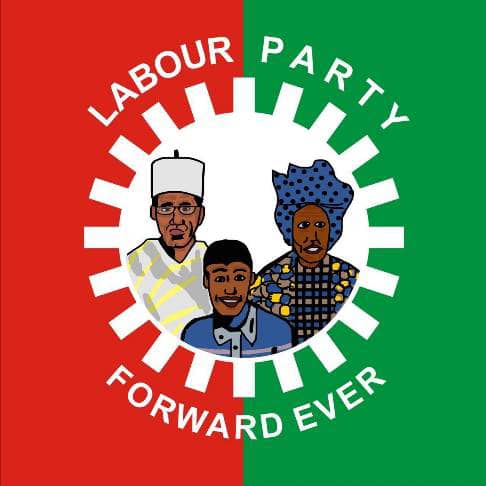
By Our Correspondent
The Labour Party Caucus in the House of Representatives has expressed disappointment and concern that the ruling All Progressives Congress (APC) is prioritizing 2027 politics over the welfare and security of Nigerians, labeling it insensitive, unconscionable and a clear example of questionable leadership.
They emphasized that while the President’s aspiration for re-election is legitimate, his priority should be addressing the pressing challenges facing Nigerians.
In a statement issued by the Labour Party Caucus Leader, Hon. Afam Victor Ogene, in Abuja on Sunday, the lawmakers reiterated that the primary duty of a government is to ensure the welfare and security of its citizens. However, they criticized the APC and President Bola Tinubu for prioritizing their 2027 reelection bid over these fundamental responsibilities. The statement expressed concern and bewilderment that while the nation grapples with insecurity, the ruling party is either ignoring the issue or offering superficial solutions rather than addressing the problem effectively.
These concerns were raised amid escalating insecurity nationwide and the administration’s struggles to fund budgets and demonstrate accountability. “The situation has led to prolonged protests by local contractors who remain unpaid for completed projects, sparking economic hardship, stalled development, and a dearth of new projects.”
Recently, these aggrieved contractors have been holding vigils outside the Ministry of Finance, highlighting the government’s shortcomings.
The Labour Party representatives highlighted that the “Appropriation Act, a law governing budget allocation, has been consistently disregarded by the current administration.” They pointed out the irony of the government pursuing costly projects like the controversial multi-trillion naira coastal road without proper appropriation or procurement processes, while essential federal road infrastructure lies in disrepair. This has raised concerns among citizens, particularly those planning to travel during the festive season, who face not only difficult road conditions but also heightened insecurity.
Also of grave concern is the opaque expenditure of N17.5 trillion, in 2024 alone, on a pipeline-security contract, as revealed in the recently audited accounts of the Nigerian National Petroleum Company, NNPC.
“Nigerians would remember that over a 12-year period, the country spent about N18 trillion on subsidy(which benefitted everyone through affordable transportation and cheaper costs of foodstuffs), but on the excuse of lack of funds to sustain the subsidy regime, this Administration has clearly robbed Peter(Nigerians), to pay Paul(cronies), through a questionable pipeline-security contract whose executors are unknown.”
This statement paints a grim picture of Nigeria’s current state, highlighting concerns about the effectiveness of its government branches. “The executive is seen as underwhelming, the judiciary’s decisions are questioned, and the legislature is criticized for not having the moral fiber to hold the executive accountable.
“Our dear country, Nigeria has become a special economic zone: everyone and everything now has a price. Kidnappers and bandits now have prices on the heads of the citizenry; elected officials now have a price to look the other way; and opposition figures have prices to enthrone chaos in their own platforms. Even the clergy and ulamas are not spared the chicanery of the divisive effects of a gravely monetized polity.
“Pray, Nigerians, we’re in the 12th month of the year, 2025. In fact, across government owned enterprises, ministries, departments, and agencies of government, none can boast of 10 percent of execution of the capital component of the budget. In most cases, the scorecard reads nil.
“Yet everyone carries on, as though this has become the new normal.
Worse is the glaring impunity of relevant officials not bothering to explain to anyone where revenues meant for the implementation of the budget have ‘disappeared’ to.
“Nigeria is on a negative cruise; local contractors occupying the offices of the Federal Ministry of Finance, retired police officers taking over the gates of the National Assembly, while kidnappers freely choose where to strike every single day, yet the only response by government is to launch and distribute vehicles for a purported Renewed Hope Agenda.
So, while the country sits on the precipice, all Mr. President thinks about is to return to power in 2027.
“Mr. President, while your quest is a legitimate aspiration, please do well to attend to the current stark realities confronting Nigerians.
Besides the parlous state of Nigerian roads – which now ensures that a hitherto six hours journey, from either Lagos or Abuja to the South South or South East, now takes an entire day to traverse – is the grim reality of possible kidnap which stares every road user in the face.
“Some lawmakers are reflecting on their roles and acknowledging that many are complicit, silenced by potential pecuniary gains. Many have described the 10th Assembly as the worst in Nigeria’s democratic history, reduced to puppetry and rubber-stamping, with no tangible benefits for citizens. They criticize the government for prioritizing economic interests over citizens’ welfare, labeling it “economic banditry.”
“We must not continue on this sorry path. Both the ruling party and opposition must put aside politics and prioritize the people’s welfare. Citizens are the backbone of democracy, and their interests should come above all else.”
Politics
Rivers Assembly Speaker, 16 others dump PDP for APC
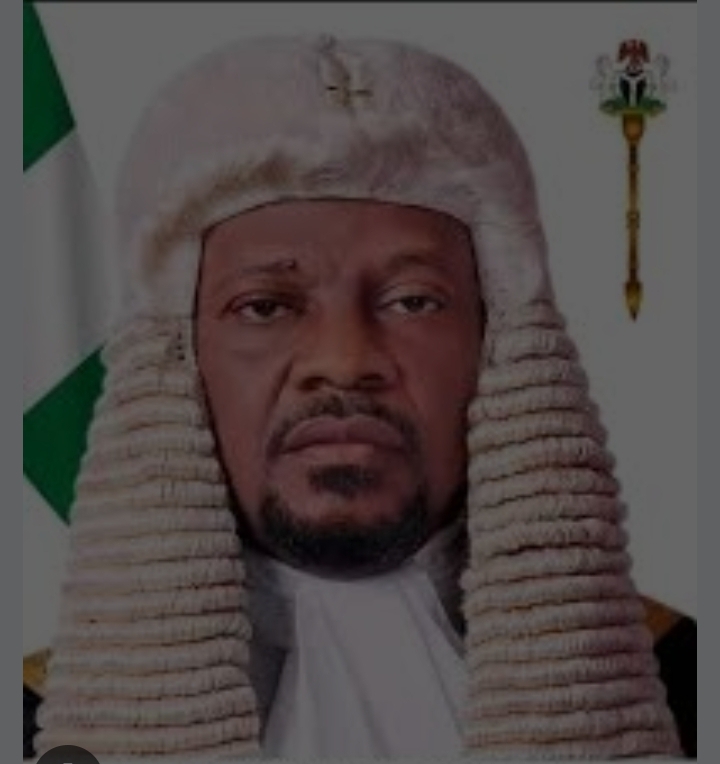
By Our Correspondent
Seventeen members of the 10th Rivers State House of Assembly, on Friday, defected from the Peoples Democratic Party (PDP) to the All Progressive Congress (APC).
The lawmakers announced their defection during plenary on Friday, December 5, 2025 at the Auditorium of the Assembly quarters currently used as the hallowed chambers.
The defected lawmakers, led by Speaker of the House, Martin Amaehwule, cited the division in the PDP at the national level as the reason for their defection, noting that the situation has made the future of the party “hazy and nebulous”.
Among the lawmakers who defected to the All Progressive Congress were; the Speaker, Martin Amaewhule, Deputy Speaker, Dumle Maol, Majority Leader, Major Jack, Deputy Majority Leader, Linda Somiari- Stewart, Chief Whip, Hon. Frankline Nwabuchi, and the Deputy Whip, Hon. Ofiks Kabang.
Others are; Hon. Peter Abbey, Smart Adoki, Igwe Aforji, Arnold Davids, Enemi George, Tekenari Granville, Christian Nwankwo, Gerald Oforji, Azeru Opara, Lolo Opuende, and Hon. Solomon Wami.
Recall that the Speaker, Martin Amaehwule had in December 2023, in the heat of the over two years political crisis in the state, led all 27 members of the Assembly loyal to the FCT Minister to the APC but later denied their defection, and returned to the PDP.
Meanwhile, the PDP which is now the minority party in the House with 9 members, has constituted their officers with Hon. Sylvanus Nwankwo emerging the Minority Leader, Hon. Barile Nwakoh was elected Deputy Minority Leader, Hon. John Dominic Iderima, Minority Whip, and Hon. Justina Emeji, Deputy Minority Whip.
The Assembly has also renewed its earlier call on the State Governor, Sir Siminalayi Fubara to forward his list of Commissioner-nominees to the House for screening and confirmation in line with the 1999 Constitution; regretting that “the State is yet to have the complement of a full cabinet.”
The Assembly also reaffirmed its earlier resolution made on the 14th of December, 2023, and adopted the auditorium at the State House of Assembly quarters as its legitimate and lawful Chamber for the conduct of legislative businesses for the life of the Tenth Assembly of the State.
Speaker of the Assembly, Martin Amaehwule in his speech lauded President Bola Tinubu for his purposeful and exceptional leadership and pledged their support to the APC and the President.
Politics
Sulu – Gambari , Ita Enang , Dambazzau , Ibas Ibok -Ete, 61 others make Tinubu’s Ambassadorial list
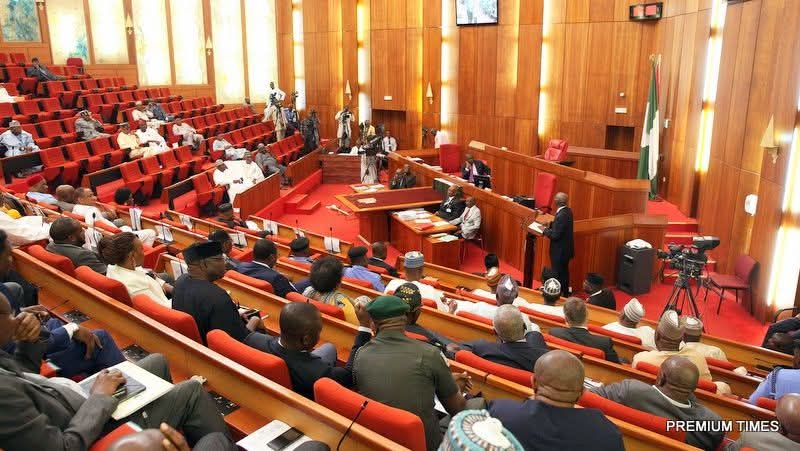
By George Mgbeleke
The Senate Thursday received requests for confirmation of nominations of 65 Ambassadorial nominees from President Bola Ahmed Tinubu.
The nominees as read from two different lists by the President of the Senate , Godswill Akpabio during plenary, fell into two categories of 34 Career Ambassadors and High Commissioners and 31 Non – Career Ambassadors and High Commissioners designate .
Notable names among the 34 Carrer Ambassadors and High Commissioners are Ambassador Sulu – Gambari Olatunji Ahmed from Kwara State , Ambassador Ahmed Mohammed Monguno from Borno State , Ambassador
Maimuna Ibrahim from Adamawa State etc .
Notable in the list of Non Career Ambassadors and High Commissioners are Senator Solomon Ita Enang from Akwa Ibom State , Vice Admiral Ibas Ibok – Ete from Cross River State , Ex Chief of Army Staff, Abdulrahaman Dambazzau from Kano etc .
President Tinubu in the requests hinged on section 171 sub section 1, 2 and 4 of the 1999 Constitution , sought for expeditious consideration of the nominees .
Accordingly, the President of the Senate, forwarded the requests to the committee on Foreign affairs for screening and report back within one week .
Recall that President Tinubu had earlier forwarded to the Senate , three ambassadorial nominees last week for appointment confirmation .
The three earlier nominees , namely
Kayode Are ( Ogun State), Aminu Dalhatu ( Jigawa) and Ayodele Oke ( Oyo State ), were screened on Wednesday by Senator Abubakar Sani Bello ( Niger North ) led committee .
Full list of the Ambassadorial nominees per state reads : ” Ambassador Ezenwa Chukwuemeka ( Abia ) Maimuna Ibrahim ( Adamawa ), Monica Ogochukwu ( Anambra) ,
Ambassador Mohammed Mahmoud Lele ( Bauchi) ,
Endoni Sindo ( Bayelsa) and Ambassador Ahmed Mohammed Minguno ( Borno ) .
Others are Jane Adams Okon Michael ( Cross River ), Clark Omeruo Alexandra ( Delta ), Chimma Geofrey Davies ( Ebonyi) ,
Oduma Yvonne Ehinose ( Edo State ), Wasa Segun Ige ( Edo State )
Ambassador Adeyemi Adebayo Emmanuel ( Ekiti ), Ambassador Onaga Ogechukwu Kingsley ( Enugu ) and
Magaji Umar ( Jigawa) .
Other nominees in the category of Career Ambassadors are
Mohammed Saidu Dahiru ( Kaduna ) ,
AbdulSalam Abus Zayat ( kano) ,
Shehu Barde ( Katsina ) , Aminu Nasiu ( Katsina ),
Abubakar Musa Musa ( Kebbi) ,Mohammed Idris ( Kebbi) ,
Bako Adamu Umar ( Kogi ) ,
Sulu Gambari Olatunji Ahmed ( Kwara ),
Ramata Mohammed ( Lagos ), Shaga John Shama ( Nasarawa )
Salau Hamza Mohammed ( Niger ) and Ibrahim Danlami ( Niger ) .
Others are
Adeola Ibrahim Mopelola ( Ogun) ,
Ruben Abimbola Samuel ( Ondo),
Akande Wahab Adekola ( Osun) ,
Adedokun Esther ( Oyo) ,
Gedagi Joseph John ( Plateau ) ,
Luther Obomode Ayokalata ( Rivers ),
Danladi Yakubu Yaku ( Taraba ) and
Bello Dogondaji ( ( Zamfara ) .
Names on the list of the 31 Non – career ambassadorial nominees are
Senator Grace Bent ( Adamawa ) , Senator Eta Enang ( Akwa – Ibom),
Nkechi Linda Okocha ( Anambra ),
Mahmud Yakubu ( Bauchi )
Philip K. Ikurusi ( Bayelsa ) ,
Paul Oga Adikwu ( Benue ),
Vice Admiral Ibok-Ette Ibas rtd ( Cross River ),
Hon. Abasi Braimah ( Edo ) and
Erelu Angela Adebayo Ekiti )
Others are Barrister Olumilua Oluwayimika Ayotunwa ( Ekiti ),
Rt. Hon. Ifeanyi Ugwuanyi ( Enugu State ) ,
Barr. Mrs. Chioma Ohakim ( Imo State ),
Lt. Gen. Abdulrahman Bello Dambazau (rtd.) ( Kano State ),
Hon. Tasiu Musa Maigari ( Katsina ) ,
Alhaji Abubakar Sanusi Aliyu ( Kogi) and
Olufemi Pedro ( Lagos State ) .
Others are
Barr. Mohammed Ubandoma Aliyu ( Nasarawa ),
Senator Jimoh Ibrahim ( Ondo), Ambassador Joseph Sola Iji ( Ondo ),
Fani-Kayode ( Osun ) , Professor O. Adewole ( Osun) , Florence Ajimobi ( Oyo ), Lola Akande ( Oyo), Professor Nora Ladi Daduut ( Plateau) , Yakubu N. Gambo ( Plateau ) , Chukwujinka Okocha ( Rivers ) , Haruna Abubakar ( Sokoto ) , Rt Hon Jerry Samuel Manwe ( Taraba ) and Adamu Garba Talba Nangree ( Yobe State ) .
-

 Business & Economy4 months ago
Business & Economy4 months agoPC-NCG Issues Disclaimer on Purported Nigerian Coast Guard National Orientation Exercise In Anambra State
-

 Entertainment1 year ago
Entertainment1 year agoJubilation galore as Parishioners of CKC Kurudu celebrate their cultural heritage ….FG should exploit our Cultural heritage to unite Nigerians-Rev Fr Dim
-

 Law & Crime6 months ago
Law & Crime6 months agoICPC pledges to collaborate with FIDA to end Sex for Marks in tertiary institutions
-

 General News1 year ago
General News1 year agoCelebration galore as UDA Successfully Elected New Exco ……I will digitalize processes that will raise UDA to greater height -Comr. Okejiri
-

 General News2 years ago
General News2 years agoReps hold public hearing on FMC Ugwuaji Awkunanaw
-

 Law & Crime5 months ago
Law & Crime5 months agoLegal practitioner raises alarm over threat to his life by CSP Muhammed Abdulkareem
-

 General News1 year ago
General News1 year agoKugbo Hill Tragedy: Trailer Crushes Car, Kills Four and Injures Several Others in Abuja
-

 Politics3 months ago
Politics3 months agoASUU-NDU protest against FG loans, unpaid salaries,Non-Implementation of agreements …..says loans is generational slavery

